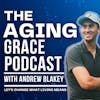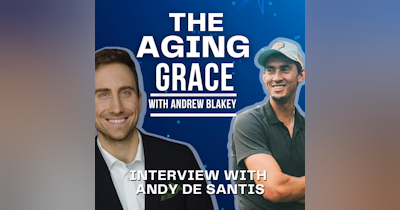Nutrition And Aging
Are you interested in nutrition? Do you want to age in a healthy way? If your answer is “yes” to both these questions, you’re at the right place. Before we move forward, remember, when it comes to healthy aging, many factors come into play, but we’ll talk about the real deal when it comes to aging gracefully: ‘nutrition’.
In a recent episode of my podcast "The Aging Grace”, things got really interesting as we dived headfirst into the world of eating right for aging like a pro.
Learn From Andy, Registered Dietitian - About How You Can Use Nutrition To Age Gracefully
Renowned dietitian and author, Andy De Santis, pulled back the curtain to reveal some seriously eye-opening insights into how our dietary choices can influence not just how long we live, but how well we live as we age.
Buckle up, because this episode, “Interview With 11x Author and Dietitian Andy De Santis - Exploring the Vital Link Between Nutrition and Aging”, you don't want to miss!
Insights shared in our enlightening conversation about Nutrition And Aging
1. Understanding Supplements
Supplements fill up pharmacy shelves and online stores. This often prompts a flurry of questions and uncertainties. Andy, our seasoned Registered Dietitian, offers a comprehensive breakdown of supplements, categorizing them into three distinct realms, each with its own significance.
- Filling Nutrient Gaps:
Andy emphasizes the vital role supplements play in bridging nutrient deficiencies that may arise from dietary gaps. He highlights the importance of essential nutrients such as Vitamin D, Omega-3 fatty acids, and Magnesium.
These nutrients, crucial for overall health, are sometimes lacking in our daily diets. While Andy acknowledges the potential benefits of supplementation, he stresses that they should ideally complement a balanced diet rather than serve as a substitute.
- Addressing Specific Health Concerns:
Supplements also come into play when addressing specific health concerns. Andy gives examples like probiotics for managing Irritable Bowel Syndrome (IBS) or turmeric supplements for alleviating arthritis symptoms.
Backed by scientific evidence, these targeted supplements can positively impact one's well-being. However, Andy advocates for a selective approach and urges us to rely on evidence-based recommendations when incorporating supplements into our routine.
-
Navigating the "Luxury" Realm:
Delving into the more nebulous territory of "luxury" supplements, Andy offers cautionary advice. While certain supplements may boast tantalizing promises of cognitive enhancement or other purported benefits, Andy encourages listeners to exercise skepticism.
In this realm, evidence may not be readily available, and claims may outweigh scientific support. However, Andy's message is clear: prioritize supplements with robust evidence supporting their efficacy, steering clear of unsubstantiated promises.
2. Leveraging Nutrition for Health
The conversation seamlessly transitions to the pivotal role of nutrition in nurturing joint and muscular health, especially as we age. Andy walks us through the intricacies of protein consumption, highlighting its multifaceted benefits beyond mere muscle maintenance.
The Importance of Protein in Healthy Aging:
Andy kicks off the discussion by emphasizing the significance of protein in healthy aging. He highlights how protein is essential for muscle retention and building, crucial factors in maintaining mobility and strength as we age.
Protein’s high thermic effect makes it a valuable asset in managing weight and promoting satiety. You’re probably wondering what high thermic effect means. It means it requires more energy to digest. Andy points out that older adults may have higher protein requirements to offset age-related muscle loss and support overall health.
This is why incorporating protein-rich foods into meals can help meet these increased needs and promote healthy aging.
Understanding Blood Sugar and Its Impact:
Another key aspect we discussed is the impact of dietary choices on blood sugar levels. Andy explains how protein-rich meals can help blunt the blood sugar response, reducing the risk of conditions like insulin resistance, pre-diabetes, and type 2 diabetes.
This highlights the importance of a balanced diet that includes adequate protein sources like legumes, nuts, and lean meats. Andy emphasizes the importance of consuming complex carbohydrates and healthy fats to help stabilize blood sugar levels throughout the day.
Fiber-rich foods like whole grains, fruits, and vegetables can slow the absorption of sugar into the bloodstream, preventing spikes and crashes that can contribute to metabolic issues over time. Incorporating these nutrient-dense foods into meals and snacks can promote better blood sugar control and overall metabolic health.
Navigating Metabolic Changes with Strategic Nutrition:
We also discussed metabolism and how it changes with age. While metabolism naturally declines over time, Andy recommends focusing on tangible health markers like muscle mass, blood pressure, and blood sugar levels rather than fixating solely on metabolic rate.
He suggests incorporating regular blood tests to monitor these markers and adjust dietary habits accordingly. Andy advocates for a strategic approach to nutrition, emphasizing the importance of protein diversity and regular intake throughout the day.
Protein consumption should be spread across multiple meals. This way, you can utilize its satiating benefits and optimize muscle synthesis.
Practical Tips for Healthy Aging:
Throughout the episode, Andy De Santis offers practical tips for promoting healthy aging through nutrition. He advocates for diversifying protein sources, including legumes, nuts, seafood, and plant-based proteins, to reap the unique benefits each offers.
If you incorporate these foods into daily meals, you can enhance nutrient intake, promote satiety, and support overall health.
In addition to diversifying protein sources, Andy recommends focusing on nutrient density when planning meals and snacks. Choosing whole, minimally processed foods rich in vitamins, minerals, and antioxidants can provide essential nutrients needed for healthy aging and disease prevention.
By prioritizing nutrient-rich foods and minimizing your intake of processed and sugary items, you can support your long-term health and vitality.
Key Takeaways:
- Holistic Nutrition: Andy advocates for a holistic approach to nutrition, emphasizing the importance of whole foods and dietary diversity.
- Evidence-Based Supplementation: While supplements can bridge nutrient gaps and address specific health concerns, Andy advises discernment and prioritization of evidence-based options.
- Strategic Nutrition: Tailoring nutrition to individual needs, especially as one ages, is crucial for maintaining health and vitality. This includes regular protein intake, diverse food choices, and proactive management of metabolic health.
- Continuous Learning: Nutrition is a dynamic field, and staying informed is key. Andy encourages listeners to engage with credible sources and seek guidance from qualified professionals.
To Wrap it All Up…
My conversation with Andy De Santis sheds light on the vital link between nutrition and aging. We can extend our lifespan and improve our quality of life as we age by making informed dietary choices and prioritizing nutrient-rich foods.
Remember, it’s never too late to start learning about nutrition and prioritizing your health.
If you’re looking to dive deeper into the world of nutrition and healthy aging, Andy's Instagram, @andytherd, is a valuable resource. You can explore more about the Aging Grace podcast on its website. Follow up on the episodes on any platform of your choice, Spotify, Apple Podcasts, and many more.








